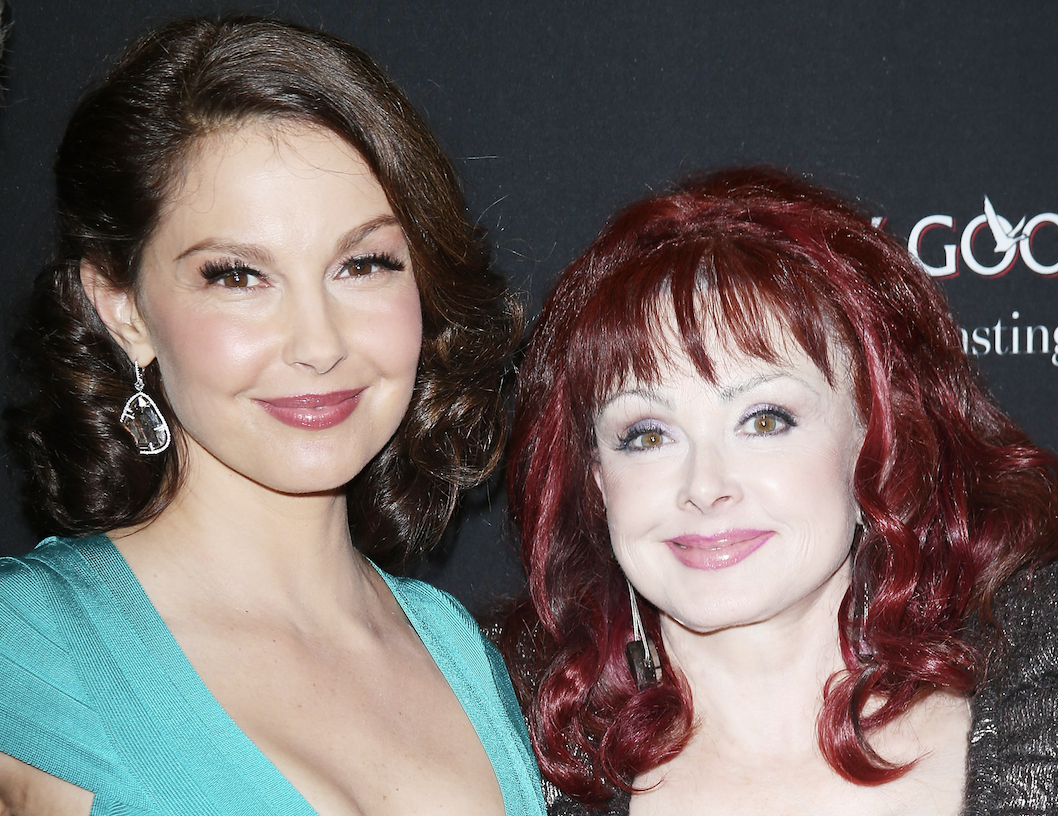Ashley Judd wants her The Judds singer mother to be remembered for how she lived, not how she died.
The Double Jeopardy actress and humanitarian penned in a New York Times guest essay about the horrors of that day — when Naomi Judd died by suicide — and the family’s efforts to keep records from the death investigation sealed.
“April 30, 2022, was the most shattering day of my life,” Ashley began. “My beloved mother, Naomi Judd, who had come to believe that her mental illness would only get worse, never better, took her own life that day. The trauma of discovering and then holding her laboring body haunts my nights.”
The activist said the family is still mourning the country superstar, who struggled with mental illness, while “rampant and cruel misinformation that has spread about her death, and about our relationships with her, stalks my days. The horror of it will only worsen if the details surrounding her death are disclosed by the Tennessee law that generally allows police reports, including family interviews, from closed investigations to be made public.”
Ashley wrote that while she “could not help” Naomi, who “lost a long battle against an unrelenting foe that in the end was too powerful to be defeated,” she can “do something about how she is remembered. And now that I know from bitter experience the pain inflicted on families that have had a loved one die by suicide, I intend to make the subsequent invasion of privacy — the deceased person’s privacy and the family’s privacy — a personal as well as a legal cause.”
Earlier this month, Naomi’s family — Ashley, her sister and The Judds singer Wynonna and Naomi’s husband Larry Strickland — filed a petition in a Tennessee court to seal the police reports and recordings from the investigation into Naomi’s death. They argued that the release of the records — including interviews with Ashley and Strickland — would cause trauma and irreparable harm. Tennessee law typically allows law enforcement records to be released, but police are permitted to hold records during an ongoing investigation. Once an investigation is closed, the records are usually released, per the Associated Press.
In her essay, Ashley — who discovered Naomi in a bedroom and was there as she took her final breaths — said she “felt cornered and powerless as law enforcement officers began questioning me while the last of my mother’s life was fading” in those final moments. “I wanted to be comforting her, telling her how she was about to see her daddy and younger brother as she ‘went away home’ … Instead, without it being indicated I had any choices about when, where and how to participate, I began a series of interviews that felt mandatory and imposed on me that drew me away from the precious end of my mother’s life. And at a time when we ourselves were trying desperately to decode what might have prompted her to take her life on that day, we each shared everything we could think of about Mom, her mental illness and its agonizing history.”
Ashley made it clear investigators were just following protocol — “terrible, outdated interview procedures and methods of interacting with family members who are in shock or trauma and that the individuals in my mother’s bedroom that harrowing day were not bad or wrong. I assume they did as they were taught.” However, “the men who were present left us feeling stripped of any sensitive boundary, interrogated and, in my case, as if I was a possible suspect in my mother’s suicide.”
She said she hoped the petition filed to prevent the public disclosure of the investigative file, including “interviews the police conducted with us at a time when we were at our most vulnerable” and Naomi’s “profoundly intimate personal and medical information” do not become public in any way. She said they are “waiting with taut nerves for the courts to decide.”
Ashley expressed “deep compassion for Vanessa Bryant and all families that have had to endure the anguish of a leaked or legal public release of the most intimate, raw details surrounding a death. The raw details are used only to feed a craven gossip economy, and as we cannot count on basic human decency, we need laws that will compel that restraint,” she wrote, calling on leaders in Washington, D.C., and at the state level to provide basic protections “for those involved in the police response to mental health emergencies.”
Ashley ended by remembering her mom and her rise from a small town girl in Kentucky to a member of the Country Music Hall of Fame. And while Naomi had no shortage of accolades and accomplishments, “I know her as my mama, who put salt and pepper shakers beside each place setting for our family suppers and relished talking about subjects as diverse as paleoanthropology and neuroscience,” she wrote. “She should be remembered for how she lived, which was with goofy humor, glory onstage and unfailing kindness off it — not for the private details of how she suffered when she died.”
Ashley shared her essay on social media Wednesday, writing, “Today, I pour my soul into describing the four interviews I was given no choice in doing the day our beloved mother died, and why such material should remain private for all families in the devastation the follows suicide. We need better law enforcement procedures and laws that would allow suffering families and their deceased loved one more dignity around agonizingly intimate details of their suffering. Autopsies are public record. So are toxicology reports. We have shared our story so openly, to raise awareness, reduce stigma, to help people identify, and make sure we all know we face mental illness together. What more do folks want us to give of our grief?”
Naomi died on April 30 at the age of 76. “We lost our beautiful mother to the disease of mental illness,” Ashley said in a statement on behalf of herself and her sister. The next day, The Judds were inducted into the Country Music Hall of Fame, with Wynonna accepting the honor. She announced the planned The Judds: The Final Tour would continue without her mother but in tribute to her.
Earlier this month, it was reported that Ashley and Wynonna were left out of Naomi’s will with Strickland serving as executor of her $25 million estate. However, the daughters and Strickland put on a united front in soon after in their filing to keep Naomi’s death investigation sealed. According to the documents, Ashley was in “clinical shock, active trauma and acute distress” following her mother’s death and didn’t want recordings of interviews with the police to be made public. Strickland stated he was unaware his interviews with police were being recorded. The petition also stated the family wants to prohibit the disclosure of Naomi’s medical records.
If you or someone you know is experiencing suicidal thoughts, call 911, or call the National Suicide Prevention Lifeline at 988 or 1-800-273-8255 or text HOME to the Crisis Text Line at 741741.




